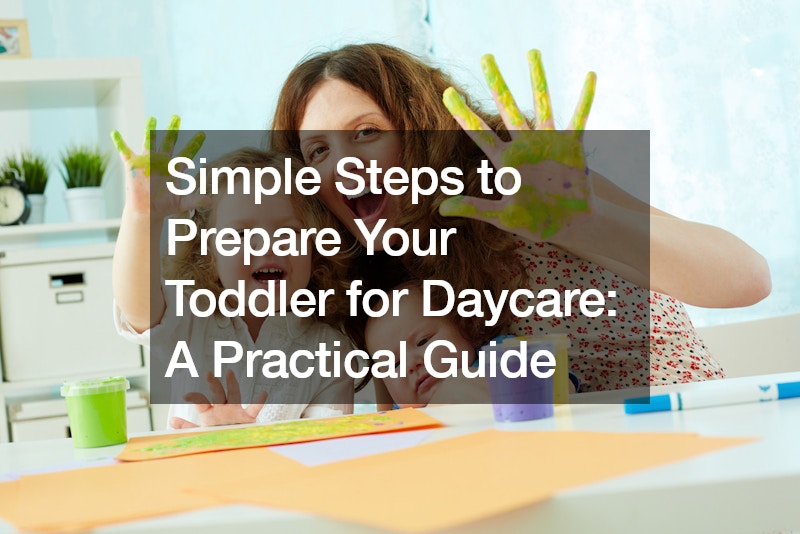As parents, one of the most significant transitions we face is preparing our toddlers for daycare. This step marks a new chapter for both child and parent, filled with excitement, anxiety, and a whirlwind of emotions. Ensuring a smooth transition requires thoughtful planning and preparation.
In this practical guide, we’ll explore simple steps to prepare your toddler for daycare.
1. Stay Up to Date with Immunizations
Before your child embarks on their daycare journey, it’s crucial to ensure they are up to date with their immunizations. Most daycares require proof of immunization, prioritizing the health and safety of all children under their care. Be sure to have a copy of your child’s immunization records readily available to provide to the daycare.
2. Label Everything
In the bustling environment of a daycare, it’s easy for items to get misplaced or confused with others. Invest in durable labels to mark your child’s belongings, including clothes, shoes, bottles, and other essentials. This simple step not only helps daycare staff keep track of your child’s belongings but also prevents mix-ups with other children’s items.
3. Familiarize Yourself with the Daycare Calendar
Every daycare operates on its own schedule, including holidays and special events. Familiarize yourself with the daycare calendar to ensure you’re aware of any upcoming closures or activities. This knowledge allows you to plan your work schedule accordingly and ensures you don’t miss out on special events such as your child’s first Christmas concert.
4. Prepare Mentally for Separation Anxiety
Separation anxiety is a common experience for both toddlers and parents during the transition to daycare. It’s natural for your child to cry during drop-off, but rest assured, this phase typically passes with time. Stay patient and offer reassurance to your child as they adjust to their new environment. Remember, it’s a sign that they are forming secure attachments and building confidence in their independence.
5. Pack Essential Items
When packing your child’s daycare bag, prioritize essential items that will keep them comfortable and cared for throughout the day. Include soothing toys for comfort, labeled bottles for milk and water, and a change of clothes in case of spills or accidents. Additionally, don’t forget to pack diapering supplies, including diapers and wipes, to ensure your child’s hygiene needs are met.
6. Provide Comfortable Sleeping Gear
Naptime is an integral part of the daycare routine, so it’s essential to provide comfortable sleeping gear for your child. Consider using a fleece blanket as a bedsheet for added warmth and comfort during naptime. Invest in sleep sacks with sturdy closures to ensure your child stays cozy and secure throughout their rest.
7. Choose Appropriate Footwear
Selecting the right footwear for daycare is essential for your child’s comfort and development. Opt for shoes with sturdy rubber soles that provide support and stability as your child explores their surroundings. Avoid shoes with fabric soles, as they may hinder your child’s gross motor skills development.
8. Season-Specific Items
Depending on the time of year, your child may require additional items for outdoor activities. During the summer months, pack a hat and sunscreen to protect your child from the sun’s rays. In contrast, winter calls for proper winter gear, including waterproof mittens, boots, and a snowsuit to keep your child warm and dry during outdoor play.
9. Establish a Routine
Consistency is key when it comes to daycare success. Establishing a consistent routine at home can help ease the transition for your child. Set regular wake-up times, meal schedules, and bedtime routines to provide structure and predictability in your child’s day. This familiarity will help them feel more secure and confident in their new environment.
10. Communicate with Daycare Staff
Open communication with daycare staff is essential for ensuring your child’s needs are met. Take the time to introduce yourself and your child to the daycare providers, and don’t hesitate to share any specific concerns or preferences you may have. Building a positive relationship with the daycare staff creates a supportive environment for your child’s growth and development.
11. Practice Self-Care
Lastly, don’t forget to prioritize self-care during this transition period. Taking care of yourself physically, mentally, and emotionally will enable you to better support your child through the daycare adjustment. Remember to carve out time for relaxation, hobbies, and social connections to recharge and rejuvenate.
In conclusion, preparing your toddler for daycare is a significant milestone that requires careful planning and preparation. By staying organized, mentally preparing for separation anxiety, and packing essential items, you can ensure a smooth transition for both you and your child. Remember, daycare provides valuable opportunities for socialization, learning, and growth, setting the stage for a bright future ahead.
.

